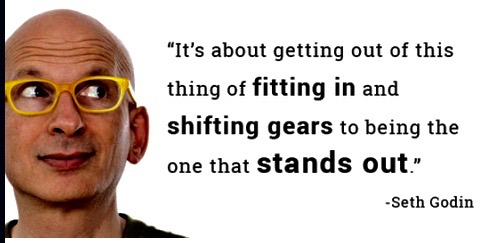Last chance to save on Digiday Publishing Summit passes is February 9

Mark Duffy has written the Copyranter blog for 11 years and is a freelancing copywriter with 25-plus years of experience. His hockey wrist shot is better than yours.
Last week, AdAge published an article by Melinda Welsh, CMO of Chase Auto Finance, titled “Five Ways To Become A Change Agent In 2017.”
Welsh lays out her roadmap (my word) for how you, marketing underling, can become a change agent like her. She says stuff like, “Identify who owns the customer experience”:
“Think about your Thanksgiving dinner this year. The host likely determined ahead of time who would cook the meal and, assuming he or she delegated some responsibility, it all came together through collaboration. In this way, preparing everyone’s favorite annual feast is analogous to choosing which departments in a company take ownership of the customer experience.”
Yeah, I’m not following this straining analogy at all, Melinda. But I’m pretty sure the customer owns the “customer experience.”
She also states, “Keep those eyes on the horizon”:
“Don’t just fall back on what’s worked before … and really think about what is next. Take my 11-year-old daughter as an example: she does not watch TV! But she’s absolutely glued to video content on her phone, and what she finds interesting and relevant is very, very different than what we’re used to. Ignoring these signs today, makes pivoting harder tomorrow…”
Successfully “pivoting” really isn’t that hard. A good head-fake, a quick first step and just take it right to the hole with authority. Works for me every time.
But you know what? You may already be a change agent! Keep reading, and see if any of this makes you feel “highly engaged” and/or “hyper relevant.”
Does the word “channel” make you perk up? It’s not just about turning a nob on a TV anymore, my goodness, no. You need to be not merely cross-channeling or multi-channeling. You need to be OMNI-channeling. If you have to ask what omni-channeling is, you, sir/madam, are not a change agent.

You understand that you’re not merely a marketer, but a “transformer.” Thus, you understand the transformative power of a holistic customer journey strategy as you follow potential buyers down the purchase funnel. Don’t forget your Big Data parachute!
And you, change agent, you’re not merely mining “influencers.” You’re digging up “micro-influencers.” And you’re not just white-papering innovations, you’re producing “mininnovations.” And you’re never happy with mere aspirational or authentic work. You demand “aspirational authenticity.” From your agency. From your coworkers. And especially from yourself. Otherwise, why are you even here?

Godin was one of the first change agents. Read those 20 words. Now read them again. Never have so few words added so much to the Marketing Value Chain (MVC).
When a piece of content goes live, you’re always poised to leverage the power of first-mover enthusiasm. If you’re a change agent, this goes without saying. But you’re also keenly aware of cash-rich “luminaries,” and you’re ready to engage with them with your cognitive cultural currency.

Lastly, let’s talk about your “content.” Is it “cutting edge”? It’s 2017, bucko. It better be more than immersive; it needs to be “bleeding edge.” And no matter what kind of content it is — snackable, UGC, story-doing (storytelling is dead; change agents already know this), it better be “people-based.” And there better be multiple touchpoints, with zero of those touchpoints being painpoints. I think I’ve made my point.
So are you a change agent? If you’re still not sure, just change your title and get some new business cards made. If your boss objects, ask her/him why he/she is so afraid of change?
More in Marketing

GLP-1 draws pharma advertisers to double down on the Super Bowl
Could this be the last year Novo Nordisk, Boehringer Ingelheim, Hims & Hers, Novartis, Ro, and Lilly all run spots during the Big Game?

How food and beverage giants like Ritz and Diageo are showing up for the Super Bowl this year
Food and beverage executives say a Super Bowl campaign sets the tone for the year.

Programmatic is drawing more brands to this year’s Winter Olympics
Widening programmatic access to streaming coverage of the Milan-Cortina Games is enabling smaller advertisers to get their feet in the door.








